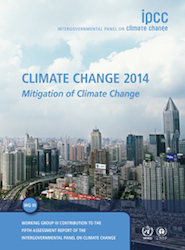The United Nations Intergovernmental Panel on Climate Change (IPCC) recently released their 2014 Climate Change Mitigation Report. According to the Global Renewable Fuels Association (GRFA), the report confirms that biofuels production is economically beneficial and that Indirect Land Use Change (ILUC) modelling is unverifiable. The report, says GRFA spokesperson Bliss Baker, is further proof that biofuels contribute to local economies and that ILUC modelling is nothing more than a flawed theory.
The report found that “Bioenergy projects can be economically beneficial by raising and diversifying farm incomes and increasing rural employment through the production of biofuels for domestic or export markets. The IPCC report went on further to say that “Brazilian sugar cane ethanol production provides six times more jobs than the Brazilian petroleum sector and spreads income benefits across numerous municipalities…Worker income is higher than in nearly all other agricultural sectors and several sustainability standards have been adopted.”
Baker says the IPCC report’s finding are consistent with one of their 2012 reports that found that global ethanol production in 2010 supported nearly 1.4 million jobs in all sectors worldwide and contributed over $273 million to the global economy. In the European Union  alone the ethanol industry created 70,000 direct and indirect jobs. The IPCC report’s findings also align with a recent study conducted by ABF Economics, which found that the U.S ethanol industry in 2013 created 86,503 jobs, sustained an additional 300,277 indirect and induced jobs while contributing $44 billion to the United States’ Gross Domestic Product and added $30.7 billion to household incomes.
alone the ethanol industry created 70,000 direct and indirect jobs. The IPCC report’s findings also align with a recent study conducted by ABF Economics, which found that the U.S ethanol industry in 2013 created 86,503 jobs, sustained an additional 300,277 indirect and induced jobs while contributing $44 billion to the United States’ Gross Domestic Product and added $30.7 billion to household incomes.
“Not only do biofuels, particularly ethanol, have the lowest CO2 abatements compared to any other renewable energy but the latest IPCC climate change mitigation report confirmed that they make significant contributions to economies around the world and in some cases like Brazil, biofuels employment is eclipsing crude oil,” added Baker.
Baker says the IPCC report contained another significant finding regarding ILUC: an attempt to predict future land use patterns globally. The report stated, “These estimates of global LUC (Land Use Change) are highly uncertain, unobservable, unverifiable, and dependent on assumed policy, economic contexts, and inputs used in the modelling.”
According to Baker, these significant findings mean that the IPCC has joined the overwhelming number of scientists and academics that have found the ILUC theory to be faulty because modeling relies on hundreds of assumptions, not facts, to predict future land use patterns around the world.
“The GRFA applauds the UN for recognizing that the ILUC theory has no ability to accurately predict future land use patterns and hopefully it can now focus on the real challenges to food security like rising crude oil prices and food waste,” Baker concluded.

